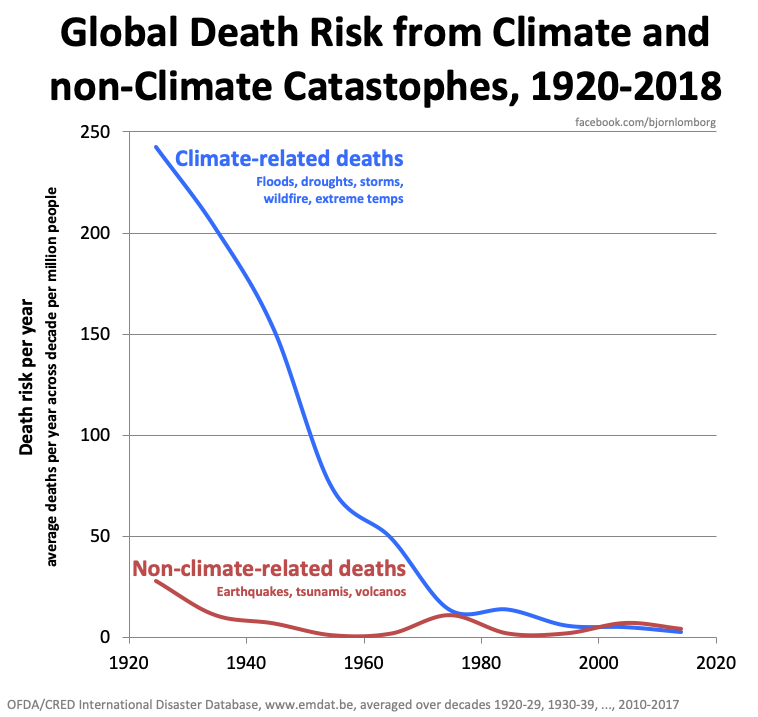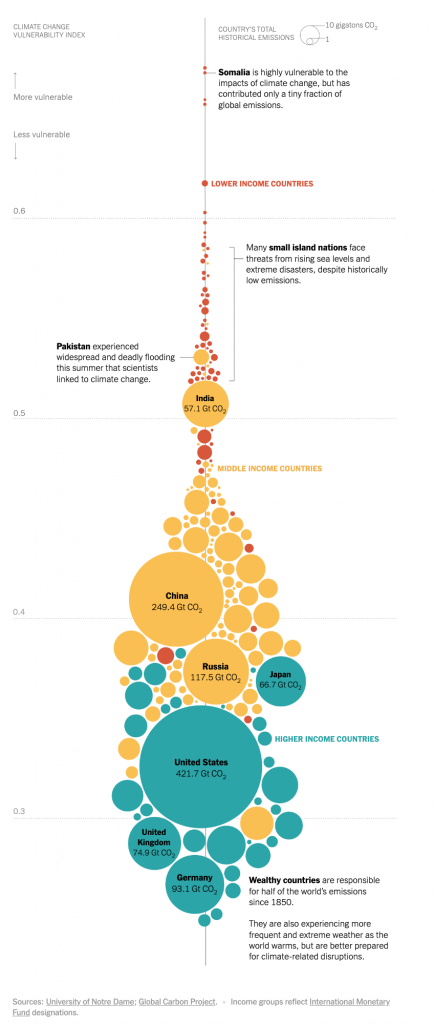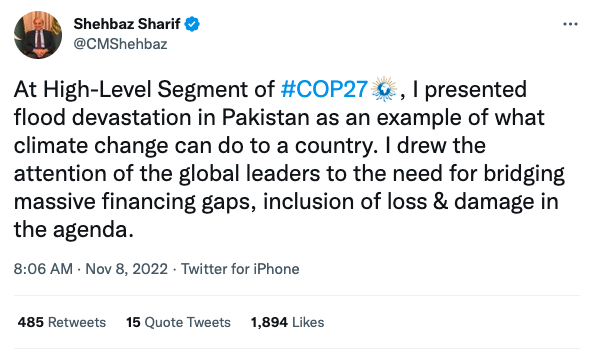
Loss and Damage at COP27
The latest progressive climate swindle
Dilapidated, crusty faces huddled in overcrowded detention centers and rank, blistered soles shuffling aimlessly beneath an overpass near the Mexican border. Inflation. Frothy rants and salty tweets. And, of course, racism. All are among the purported effects of Climate Change, as recently advertised to us unenlightened masses by our noble, progressive clergy.
It makes sense: COVID provided cover for a reconditioning of American consciousness; a reinforcement of proletarian compliance and dependence, and a solidification of administrative state “experts” as our allegedly benevolent zookeepers. Skepticism became evidence of retardation. Independent thought became evidence of sociopathy. Non-compliance became evidence—literally—used by “public servants” to strip ordinary people of their livelihoods and toss them in jail. Blind obedience nonchalantly planted itself in the carefully manicured gardens of the avant-garde and therewith became unassailably cool. Power-hungry progressives know better than to let a perfectly serviceable submissive off her leash without first trying to squeeze out a few more indulgences. And squeeze they have.
As the economy reopens to the reality of its government-induced hangover, the whirring of the left’s indefatigable propaganda machine threatens to afflict us all with tinnitus. Droughts in Africa, Mexico, and China? Climate Change. Floods elsewhere in Africa? Also Climate Change. Floods in the U.S., Iran, and Pakistan? Climate Change. Heat waves in India, Japan, California, and Europe? Climate Change. The border crisis, inflation, angry Twitter, and racism? Most certainly Climate Change. And it’s not just the media. Wall Street has completely normalized Environmental, Social, and Governance (ESG) scores so that even questioning them is now met with the same perplexed foreheads and disapproving frowns as was questioning masks on 2-year-olds, and those institutions that mocked “trickle-down” theory as delusional are quietly busy employing it to push ESG criteria all the way down to your CBDC wallet. Of course, no dystopia is complete without its suffocating layers of pious government bureaucrats oblivious to the unsettling reality that the livestock languishing under the dim-witted machinations of their presumptive guardianship are in fact not livestock at all, but fellow human beings. That’s why progressives invented the administrative state and its pestilent wet dream: the United Nations.
Loss and Damage
This week marks the 27th Conference of the Parties of the United Nations Climate Change Conference, colloquially called COP27 in order to sound (marginally) less ridiculous in Reuters wires. It’s a Marxist cross between an airing of grievances and cult-level extortion designed to blame fossil fuels (and by extension capitalism and any nation pretending to practice it) for the unavoidable fact that subsistence living sucks. Paradoxically, both China and Russia have too much self-respect to attend, but almost every other country (even North Korea) sent someone to either genuflect or panhandle at the meeting in Sharm El-Sheikh, Egypt. This year, negotiations over “loss and damage” reparations are all the rage.
Here’s the basic narrative, in a biodegradable nutshell: In some countries, people survive on less than $6.00 a day. In other countries, people have normalized $6.00 Pumpkin Spice Lattes ordered from the touchscreens of their self-driving Teslas while on the way to jobs at Diversity, Equity, and Inclusion offices, which pay them $100,000 to LARP as productive members of society. Though you couldn’t tell from the complaining, compared to the latter the former are withering, hopeless souls fated with wretched existence. To make matters worse, they find themselves tormented by relentless weather: floods, droughts, storms—it’s one catastrophe after another, and it seems to be getting worse. But after waving the magic wand of government-funded Science™, the plight of the people in poor countries turns out to be the fault of the people in rich countries. That latte comes with a titanic side of manslaughter, so put it down and pay up: reparations are in order. “Loss and damage,” they call it. You do believe in restitution, don’t you? Few at the Egypt summit will squabble too loudly over this moral reasoning, instead conceding the high ground to quibble about dollar amounts and phraseology in hopes of simultaneously scoring both virtue points and legal wiggle room.
Like most collectivist hustles, this “loss and damage” mendacity is justified via appeals to reason. Insipid parrots offer smug squawks about sound Science™ and flawless deduction, ergo anyone who disagrees is a lumbering troglodyte. But reason is more than simply stringing together conclusions from a set of unquestioned—and often unnamed—premises without regard for whether those premises are accurate and complete representations of reality. Reason is the art of non-contradictory identification of reality. It’s a process of establishing correspondence to the real world—it begins and ends with observation, first to induce premises and finally to verify conclusions. One can’t claim to be on the side of reason simply because the journey from faulty premises to skewed conclusions was deliberate and methodical (although often even that’s not the case). It’s disappointing how few people bother to understand this basic requirement. For example, even many alleged defenders of capitalism characterize Marxist ideology as “too rational,” “utopian,” or “science based,” as if the problem is that Marx and his descendants simply fail to account for some romanticized fuzzy-wuzzy je ne sais quois, but otherwise get an “A.” But Marxist ideas begin by kneecapping individual agency in favor of a de-facto kind of class determinism, completely eliding the source of human wealth (the mind), and gleefully trampling individual sovereignty. They end in implementations that leave 100+ million dead. When Ivory Towers respond by stubbornly repackaging Marx’s core premises instead of cross-examining them, that’s not reason, that’s religion.
The same is true for the left’s hallowed climate creed. From the sweet, poisoned lips of clerics at the World Economic Forum (WEF) to the easy ears of acolytes running your daughter’s elementary school, its articles of faith have effortlessly metastasized into mainstream consciousness masquerading as products of rigorous deliberation. As Alex Epstein articulates in Fossil Future, almost all climate evangelism is predicated on the anti-human standard of mitigating human impact—not to our environment, but to a fantasy construct of “the environment” more reminiscent of Disney movies than reality. Instead of human flourishing as the proper scale on which to weigh potential action, the climate cult strives for humans to have “zero impact” on the Earth. (Which is at least one metric by which the Communist democide of the 20th century achieves positive results.) Frighteningly, some people bite enthusiastically, but on the whole this level of overt misanthropy is too potent to serve cold to the vast majority of humankind. As a result, the COP27’s “loss and damage” debate is reframed into humanist terms for broader appeal, but it’s about as scientific as Scientology, and no less toxic.
Let’s cleanse.
Economic alchemy
Premise one is that some countries are rich, while others are destitute. This is true, of course, and an actual humanitarian might pause here to wonder: why? Climate activists don’t typically pause. If they happen to, it’s only to make the infantile assertion that the wealth of rich nations is due to widespread pilfering of poor people via colonialism or “exploitation” or some other boogeyman. But you can’t get wealthy stealing from poor people, and I don’t recall reading about the great African techno-industrial complex of the 18th century. Perhaps it ran on vibranium and cloaked itself to the annals of history. Slavery doesn’t produce modern wealth, either, since its pernicious threads are woven into the fabric of human existence since time immemorial, and the ancient Romans didn’t even have one Starbucks. Because leftists never seriously investigate this disparity (or, more likely, intentionally evade the responsibility to do so), their answer to this problem is always as materialistically primitive as one might expect: transfer physical resources. In other words, to compensate for stealing the wealth that poor countries, by definition, didn’t have, rich countries should hand over their actual wealth that now exists. Seize the means of production! But never wonder how such means of production come about in the first place. (Hint: individual sovereignty, which is a polite way of saying private property, which is a polite way of saying “capitalism.”)
Bad weather blows
The next assertion is that bad weather is harming—and even killing—lots of people in poor countries. Aside from mostly specious arguments about increased frequency and intensity of severe weather, the two primary items submitted for evidence are: high death tolls for singular weather-related disasters (incessantly repeated), and rising economic costs of climate damage. Recent flooding in Pakistan, for example, has killed an estimated 1,700 people, displaced a whopping 33 million, and cost as much as $40B in damages. Even rich countries like the United States get in on the action: The White House recently blogged about “The Rising Costs of Extreme Weather Events,” citing a clear rise in costly natural disasters. But using raw numbers to scare people isn’t science, its psyops.
If the goal is to objectively discuss trends in climate-related deaths, then the only honest starting point is with an accurate account of what those trends are. The absolute number of climate-related deaths has plummeted since 1920, even while the world’s population has quadrupled. Examining the risk of death per individual makes the situation even more clear: it fell 99% from 1920 to 2018.
That’s an astounding success for modernity, and appreciation for this achievement compounds when factoring in coastal migration. Population near the world’s shorelines—often most vulnerable to severe weather like tropical storms—is increasing disproportionately, and is expected to reach 6 billion by 2025. But celebrating our ability to adapt and engineer our way out of nature’s crosshairs doesn’t further the progressive agenda as well as does advertising calamity. So here we are.
Increased cost estimates are similarly deceptive: coastal migration doesn’t just mean that people move there. Infrastructure follows, which means damage to the region becomes more expensive even without an increase in disastrous meteorological phenomenon. Contextless cost measurements like this can paint a distorted picture. “The real number we want to know,” Epstein correctly argues, “is how much wealth was destroyed relative to the amount that exists and is being created.” Sometimes simply adjusting for GDP can instantly invert the narrative. While investigating flood damage, for example, Epstein reveals that “looking at the data in terms of wealth, damage from floods as a percentage of GDP in the U.S. has declined since the early twentieth century.” When they lament over catastrophic dollar figures resulting from weather damage, it’s not that climate activists have suddenly become fiscally conservative; they’re just throwing meaningless numbers around to scare people into spending orders of magnitude more on suicidal policies.
COP27 attendees don’t even have to leave the pages of the New York Times to figure out how to help people in developing nations, if that’s their legitimate concern. Consider the chart below, which was featured in A Core Question at COP27: Who Will Pay for Climate Change? and used to make the case for climate reparations.
The answer is literally written there: wealthy nations are “better prepared for climate-related disruptions.” Why? Because free(er) markets powered by cheap, reliable fossil fuels create wealth and prosperity that allows them to mitigate and adapt. Weather is nowhere near the leading cause of death in developing nations (or anywhere), and economic abundance is key to saving lives. Even potential downsides of anthropogenic climate change are far outweighed by the benefits fossil fuels provide to the creation and maintenance of modern civilization. Nature isn’t a Disney movie; its indifference to humanity can seem downright vicious at times, and the nations that have been most successful at withstanding—and even harnessing—her have done so by tapping into the energy density unique to fossil fuels. But instead of empowering poor people, progressives suffer from a malignant form of noblesse oblige that infuses resurrected colonialism with greenwashed economic dependence. It’s power to the people! But only our people.
Abracadabra, it’s Climate Change!
Atop this moldy house of damp cards a magician’s table is now placed. On it, the newly developed field of “climate attribution” promises to pull Climate Change out of a weathered top hat right before our eyes. This powerful field of magic climatology doesn’t cherry-pick data so much as eat the cherries and then post reviews on Yelp. A climate attribution scientist begins with CNN: what’s on the news? If bad weather is doing a sensational job of making headlines by ruining the lives of poor sods halfway across the globe, then it’s time to fire up MATLAB and get to work looking for evidence that Climate Change is a contributing factor. Several computer cycles and Pumpkin Spice Lattes later, out pops a weak, often non-quantifiable answer: yep! Being scientists at heart—albeit motivated by an agenda—carefully worded 36-page reports are quickly issued so as not to miss the sunsetting news cycle, complete with graphs and data and appropriate caveats like: “this discrepancy suggests that long-term variability, or processes that our evaluation may not capture, can play an important role, rendering it infeasible to quantify the overall role of human-induced climate change.”
Assuming that the actual science is sound and that feeding a meager 100 years’ worth of data into simulations that rarely seem to correlate to reality is a viable strategy, the boldest conclusion one might draw from these efforts is something like, “anthropogenic climate change was probably one of many factors, but the size of the contribution is unclear.” As scientific conclusions seep down from LaTeX to Twitter, however, all nuance is jettisoned to fit political agendas. “At High-Level Segment of #COP27,” thumbs Pakistani Prime Minister Shehbaz Sharif, “I presented flood devastation in Pakistan as an example of what climate change can do to a country. I drew the attention of the global leaders to the need for bridging massive financing gaps, inclusion of loss & damage in the agenda.” Shake your cup, Sharif, and the coin will flow.
Climate attribution science only examines catastrophe. No one is out investigating potentially positive impacts of Climate Change. Is warmer weather in Northern regions increasing crop yields, or is increased rainfall in arid zones improving arability, or is more temperate weather elsewhere making life easier for residents? Who knows? And who cares? Climate scientists might be doing actual science, but the institution of climate science as a whole is only interested in inquiry that produces results consistent with the neo-Marxist political agenda of global leftists. Like an obsequious puppy, climate science happily performs whatever tricks its masters command, hoping for a pat on the head and a federally funded doggy treat in return. Exclusively examining the negative outcomes of a phenomenon is not science any more than exclusively calculating liabilities is accounting. It’s a performative sleight of hand, and voilà, out of the hat leaps Climate Change. You’re welcome, Greta.
Butterfly effect morality
It’s easy to blame anthropogenic climate change on rich countries, because they’re the ones burning the most fossil fuels. Cheap energy is an important component to building wealth. Still, even the U.S. Special Presidential Envoy for Climate (that’s a thing now) wants somewhat of a pass on history, arguing that before the 1980s the negative impacts of carbon emissions weren’t known. “So yeah,” John Kerry pleaded, “we burned coal and we did this. But guess who else burned coal? Every single one of those other countries. Are they absolved?” But Kerry is a lawyer, so he should know that ignorance isn’t an excuse. And really, why worm out of it? Yes, rich countries burned more fossil fuels, and if they’re going to get the resulting blame for fossil fuel usage, then they should also take the resulting credit. The cheap energy and plastic derivatives of fossil fuels are the primary material sources for the explosion in human productivity that built the entire industrialized world. They get credit for increased life expectancies, increased standards of living, refrigeration, central heating, modern healthcare, video games, and Frappuccino machines. Without their widespread adoption, the world would still be stuck in the 18th century and Greta would still be stuck on her sailboat without GPS. Properly calculated, it’s not blame that fossil fuel burners deserve, but credit. Their biggest sin against developing nations isn’t a marginal increase in average global temperature—which is dwarfed by annual variance anyway—but the insistence that their nascent economies shun cheap energy and remain dependent on first world bureaucrats and retired billionaires for handouts.
The bill is due
Progressives can’t build a mammoth administrative state by leaving people alone; they need something to administer. Redistributing wealth is a staple for central planners because inequality is the natural state of humans, which means there’s always papers to shuffle, loot to pilfer, and disproportionately productive people to beat over the head with the tax code. But tax codes are heavy, and it’s much more satisfying to manipulate psychological compliance than to so crudely reveal one’s ultimate dependence on brute force. As a result, they’ve spent generations engineering the minds of the masses to associate economic success with vague senses of guilt and obligation. Whether this feeling of duty results in cheerful compliance or resigned consent doesn’t matter too much; either one makes the manager’s job easier. Wealth redistribution simply becomes a question of cashing-in, rather than coercion.
When it comes to Climate Change reparations, once the illusory path from bad weather to collective responsibility has been laid, subjects of the administrative state are bound to amble down it all on their own. It’s a question of when they’ll agree to reparations, not if. The only job of the progressive zealot is to make sure that people don’t examine the ground beneath them too closely. Keep them looking up at disaster, suffering, numbers with lots of zeros, and compelling human interest podcasts with mournful music and breathless audio from lives destroyed by winds and rain. Shower them with reams of graphs and detailed arguments about settled science, offering conveniently misleading soundbite distillations as umbrellas. Immediately and ruthlessly turn skeptics into pariahs, mocking their intellect and casting aspersions in the shape of knavish shadows. Reparations are inevitable.
But what wealthy nations really owe the third world isn’t money, it’s the truth. The truth is that reparations are little more than cloaked colonialism hobbling the self-sufficiency necessary for actual sustainability. The truth is that the Enlightenment values of reason and individualism trump mysticism and collectivism every time. The truth is that democracy is merely a means to an end, not a panacea; without guardrails to prevent would-be administrative tyrants from shredding individual rights, democracy can be monstrous. The truth is that wealth is created by unfettered minds, not handed down from suits in Midtown Manhattan. The truth is that capitalism works, if the goal is human flourishing. The truth is that nature is brutal, and humans survive by manipulating our environment, not preserving it. The truth is that cheap energy is a crucial factor in moving from a developing nation into one of luxury. The truth is that so-called renewables are nowhere near able to sustain, let alone expand to keep up with the increased energy needs of an emerging nation. The truth is that fossil fuels—and perhaps nuclear—remain by far the best option for blossoming out of abject poverty, and contain within them all the means by which to overcome any potential downsides.
So if you happen to be at COP27, the next time a furrowed brow and scolding high rising terminal prattles on about the catastrophic effects of Climate Change, feel free to offer her—on behalf of fossil fuels—a warm, hearty, “you’re welcome.”



